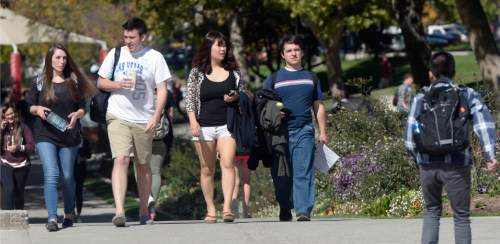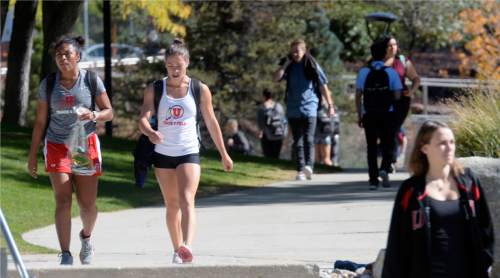This is an archived article that was published on sltrib.com in 2015, and information in the article may be outdated. It is provided only for personal research purposes and may not be reprinted.
If Utah's undergraduates take issue with the rising cost of college, few are showing up to protest it.
The odds that any one University of Utah student dropped by an annual tuition hearing this semester were less than one-tenth of a percent — and twice the likelihood of getting struck by lightning.
About 20 people dotted an auditorium at the state's flagship school March 10 before statewide tuition went up 3 percent, a university spokeswoman said.
It's the lowest increase in over a decade and down by half from some recent years. Still, it frustrates junior communication major Amanda Lau, who expects her yearly bill to climb $400 and worries about making her rent. Lau, who learned of the "truth in tuition" meeting in a university email a day beforehand, had class and asked friends to go. They didn't.
"Whenever I bring it up to someone, 'Hey, did you hear about the 3 percent increase?' They're like 'no,' " she said. "No one's talking about it. I'm wondering if it's even fazed anybody or if it's just me who's affected by it."
It isn't clear if students don't know, don't care or don't have time to learn why per-semester payments are set to rise by a few hundred dollars, depending on their degrees and credit hours.
U. student government President Justin Spangler, who was in the throes of midterms this week, declined an interview. Calls to other officers went unanswered, but some Utah college students tweeted their frustration in recent weeks.
"Thanks Utah for raising the price of college tuition so we have to pay even more than what's already a ridiculous amount!" posted one Twitter user.
Another pondered peers splurging on spring break getaways, adding, "I can't even afford to pay tuition."
Others have taken a different tack altogether. Last year, engineering student Luq Mughal protested by paying with a metal case of one-dollar bills.
Only Utah Valley University and the U.'s honors college announced the meeting through Twitter. But that is set to change next year: The U. is planning a social media blast, spokeswoman Maria O'Mara said in an email.
A 2001 state law mandates that school officials sit down with students to get their views on increases and how they should be spent. Announcements of the tuition hearings and proposed increases must appear in student newspapers, but the legislation has not kept pace with digital media, acknowledges its sponsor, former Utah Sen. Carlene Walker.
"The social media would be more likely to hit the kids," said the Cottonwood Heights Republican.
At the Capitol, Walker's "truth in tuition" initiative nearly failed. Regents balked. Lawmakers wavered. Critics questioned if anyone would show up. But a handful of student lobbyists stood firm.
"They felt like, 'hey, if we're gonna pay more, we want to be the beneficiaries of those raises,' " Walker said.
The students refused to be "blind players in the system," Kelly Ann Booth, then-director of government relations for the Utah Student Association, told the higher education panel at the Legislature, according to meeting minutes.
Walker, now chairwoman of the Utah Sentencing Commission, has heard little of the meetings in recent years.
"I don't know whether it's working, quite frankly. But at the time, it seemed like the right thing to do."
This year, there appears to be some confusion about when the law applies. Salt Lake Community College hosted the forum on Feb. 25, even though the school is not tacking additional increases on the Board of Regent's statewide 3 percent bump. About 50 students sat in on the meeting, said spokesman Joy Tlou.
Utah State University also did not add to the baseline fee, so it held no meeting this year, said spokesman Tim Vitale. Last year, about 75 students showed up.
"I think the deal is that if we're going to ask for more than the regents apply statewide, we have to go to our own students and talk to them," Vitale said. "They can provide feedback to the regents at any time they want."
At Weber State University, about 35 students sought explanations from President Charles White this year, said spokeswoman Allison Hess.
Lau, the 21-year-old U. student, said her employer, Salt Lake County, recently slashed her weekly hours as a graphic designer from 20 to 10. She has applied for various U. scholarships but hasn't gotten one yet. Lau doesn't want her mom, an underwriter for a credit union who pays for most of the tuition bills, to owe even more.
"I'm a little discouraged," said Lau, a student mentor and officer in the Asian-American, Vietnamese and Chinese student associations. "Maybe I should just drop all of it and work more."
Twitter: @anniebknox





